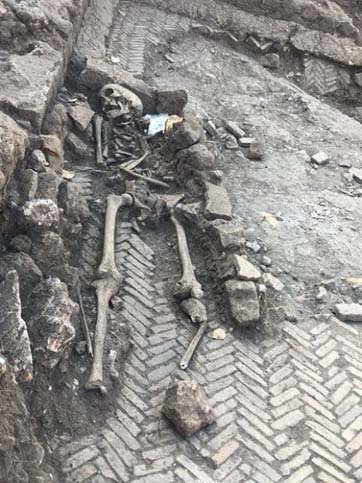Project description and backgrounds
Satricum (nowadays Le Ferriere) is the ancient name of a Latin settlement that was situated ca. 60 km south of Rome in the present-day Italian province Lazio. Forty-five years of systematically conducted archaeological research in ancient Satricum have produced an outstandingly rich and varied archaeological record, which shows evidence of uninterrupted habitation over a period of nearly 1400 years, from the early Iron Age to the late Imperial Period. Huts, houses, burial grounds, a road system with associated dwellings and votive deposits which belong to the city’s main sanctuary of Mater Matuta, represent the chief material sources that allow us to reconstruct the complex and multi-layered biography of this settlement.
In the last three years, works have focused on a segment of the lower city that revealed the remains of a Roman villa. The villa, built in the 1st century AD, remained in use until the 4th/5th century. It covers nearly 4000m2 and consists of a pars urbana and a pars rustica. The pars urbana comprises an enormous latrine and a bath complex. The mosaic and marble fragments found in the rooms make it likely that the rooms were once richly decorated. The pars rustica is only partly excavated, revealing, i.e. various basins. Stables, threshing floors, and storage rooms are assumed in the as yet unexcavated parts of the villa. Furthermore, a huge water reservoir was found with a capacity of some 80.000 litre that supplied the villa with fresh water. In the Middle Ages, the villa was used as a cemetery. So far, around 70 graves have been discovered among the Roman remains.
In summer 2023 the excavation activities will resume with the main goal of further understanding the architecture of the villa and its infrastructures.
Project website
https://www.uva.nl/en/discipline/archaeology/research/satricum/satricum-project.html
Project leader
Prof. dr. Marijke Gnade (Senior Fellow at the Royal Netherlands Institute in Rome)
Dates
The campaign starts off at the 1st of July and closes at the 12th of August 2023, running for a total of 6 weeks. Minimum participation required: 4 weeks.
Credits
Minimum 4 ECTS (4 weeks) – maximum 6 ECTS (6 weeks)
Type(s) of fieldwork planned, as well as relevant activities
During this Field School, participants will take part to the excavation and find processing activities, which run for the whole day with two breaks. The excavation consists of two main areas situated in the lower settlement area (Poggio Cavallari – Casale del Giglio Wine Factory) that will be further enlarged this year. In the afternoon, the activities will concentrate on the material excavated and kept in the storerooms next to the site.
Activities will include:
- Excavating in an open area and smaller trenches
- Documenting, and interpreting archaeological features and/or layers
- Documenting and recording archaeological data
- Finds recovery, processing and documentation (database entering, scale-drawing, digital illustration and photographs)
- Writing daily reports, which include personal observations and critical evaluations of methods, of results and their effects on fieldwork tactics
Type(s) of professional and personal skills to be obtained by students during fieldwork
You will acquire insights in how to carry out archaeological fieldwork and the necessary skills connected with an archaeological excavation. You will learn the strategies and procedures proper to the stratigraphical method (open area excavation) and to use a range of digging equipment. You will also get acquainted with the documentation protocols needed to record archaeological features, both in writing and drawing. During the afternoons you will familiarize with the material culture recovered from the villa spanning over more than four centuries, further sharpening your knowledge in artefacts and ecofacts analysis and processing. More generally, you will gain first-hand understanding of how to work in an international team and improve your communication, language, and soft skills.
Provided facilities
The accommodation of the Dutch team is located in the village center of Le Ferriere (Latina), at a short walking distance from the excavation site. The building hosts all students and trench leaders, bedrooms may accommodate up to 4 people, and all other facilities are shared. Breakfast, lunch, and dinner are included and prepared by a local cook.
Costs involved for students
To take part to the project you will have to partially contribute to the lodging and board costs (approx. €75 a week); your insurance during the field work will be covered by the Royal Netherlands Institute in Rome (KNIR), but travel insurance is mandatory. Students, enrolled in one of our partner universities (UvA, RUG, VU, UU, RU, UL) receive a €100 reimbursement of their expenses for travelling to Rome after completion of this Field School.
Number of students requested
Max 15
Health and safety precautions/regulations
To be admitted on the excavation site every student needs to be vaccinated against tetanus: Check how much time has passed from your last shot, as every ten years additional doses are recommended to maintain immunity. In addition, you will have to wear safety shoes (those used at building sites, see examples here and here) and long trousers. Mind that temperatures in July and August can easily soar to over 30 degrees, so hats and sunscreen are necessary.
Application
You’ll be requested to upload your relevant fieldwork CV, your most recent list of grades as well as your motivation letter (max. 1 page). Please note that all documents must be uploaded in PDF.
Deadline
20 April 2023
Selection will take place before the 15th of May.
Prior knowledge or experiences needed?
The field work is open to BA3 and (R)MA students in Archaeology. Participants should have successfully completed their 1st and preferably 2nd year BA fieldwork or should have prior experience in archaeological fieldwork at the 2nd-year academic or a comparable level.
More info
For more information regarding this Field School, please send an email to prof. dr. Marijke Gnade: m.gnade@uva.nl
Photocredits: La Repubblica



